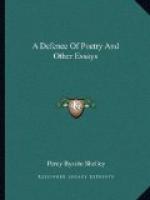The abolition of personal slavery is the basis of the highest political hope that it can enter into the mind of man to conceive. The freedom of women produced the poetry of sexual love. Love became a religion, the idols of whose worship were ever present. It was as if the statues of Apollo and the Muses had been endowed with life and motion, and had walked forth among their worshippers; so that earth became peopled by the inhabitants of a diviner world. The familiar appearance and proceedings of life became wonderful and heavenly, and a paradise was created as out of the wrecks of Eden. And as this creation itself is poetry, so its creators were poets; and language was the instrument of their art: ’Galeotto fu il libro, e chi lo scrisse.’ The Provencal Trouveurs, or inventors, preceded Petrarch, whose verses are as spells, which unseal the inmost enchanted fountains of the delight which is in the grief of love. It is impossible to feel them without becoming a portion of that beauty which we contemplate: it were superfluous to explain how the gentleness and the elevation of mind connected with these sacred emotions can render men more amiable, more generous and wise, and lift them out of the dull vapours of the little world of self. Dante understood the secret things of love even more than Petrarch. His Vita Nuova is an inexhaustible fountain of purity of sentiment and language: it is the idealized history of that period, and those intervals of his life which were dedicated to love. His apotheosis of Beatrice in Paradise, and the gradations of his own love and her loveliness, by which as by steps he feigns himself to have ascended to the throne of the Supreme Cause, is the most glorious imagination of modern poetry. The acutest critics have justly reversed the judgement of the vulgar, and the order of the great acts of the ‘Divine Drama’,




